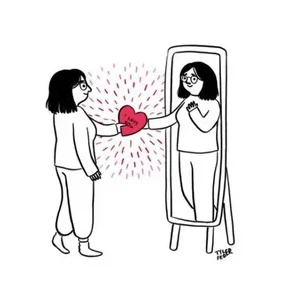Table of Contents
ToggleIntroduction
Self-acceptance is a fundamental pillar of our mental and emotional well-being, yet it’s something that many of us struggle with. In a world that often emphasizes perfection, acknowledging and accepting ourselves as we are felt like an uphill battle. This article aims to explore the concept of self-acceptance, the barriers that prevent us from embracing it, and the impact it can have on our lives. By gaining a deeper understanding of lasting self-acceptance, we can begin to cultivate a more compassionate relationship with ourselves, one marked by understanding, respect, and ultimately, lasting acceptance.

Self-Acceptance
Self-acceptance can be defined as an individual’s satisfaction or acceptance of oneself, and it is the recognition and acceptance of one’s abilities and limitations. It is an essential aspect of our self-esteem and mental health, providing us with a realistic understanding of our strengths, weaknesses, and overall self-worth.
Importance of Lasting Self-Acceptance
Lasting self-acceptance is essential in our lives as it fosters a healthy relationship with ourselves and with others. It empowers us to live authentically, make conscious decisions, and maintain resilience in the face of challenges.
Psychological Aspect
From a psychological perspective, self-acceptance is key to maintaining mental and emotional well-being. Individuals with high levels of self-acceptance are less likely to suffer from mental health issues such as depression or anxiety. They acknowledge and accept their emotions without judgment or resistance, which equips them with the ability to handle stress and adversity more effectively.
Why Lasting Self-Acceptance Matters
Mental Health Benefits
Lasting self-acceptance has significant advantages for mental health. It cultivates a state of mind where we are not continuously at war with ourselves, reducing the likelihood of developing mental health disorders such as anxiety and depression. By accepting ourselves in our entirety, we liberate ourselves from the chains of self-criticism and self-doubt, creating space for positive emotions and mental growth. Moreover, self-acceptance equips us with the necessary tools to navigate life’s adversities with resilience and fortitude.
Impact on Relationships and Interactions
In relationships and interactions, lasting self-acceptance paves the way for healthier and more fulfilling connections. When we embrace ourselves completely, we can communicate and interact authentically, fostering relationships built on mutual respect and understanding. It creates a positive ripple effect, influencing not only our perception of self but also how others perceive and interact with us. Lasting self-acceptance thus forms the bedrock of genuine and enriching interpersonal exchanges.
The Reflexion Strategy for Lasting Self-Acceptance
Reflexion, in the context of self-acceptance, is a dynamic and insightful process that allows us to deeply engage with our thoughts, feelings, and experiences. It is a core component of personal development, promoting self-awareness and fostering self-acceptance. Reflexion encourages us to observe our internal narratives without judgment, to understand our reactions, and to accept our authentic selves, fostering a healthier relationship with our inner selves.
Reflexion is a self-assessment tool, facilitating a journey inward to explore our perceptions, emotions, and behaviors. In the context of self-acceptance, Reflexion is an introspective process that prompts us to confront and embrace our authentic selves. It involves acknowledging our strengths and weaknesses with compassion and understanding, reinforcing our sense of self-worth, and boosting our self-esteem.
Understanding the ReAct Model
The ReAct Model is a systematic approach to Reflexion, designed to foster lasting self-acceptance. This model comprises three essential steps: Recognize, Accept, and Transform. The first step, ‘Recognize,’ involves acknowledging our feelings, thoughts, and behaviors. The second step, ‘Accept,’ requires us to embrace these elements without judgment or criticism. The final step, ‘Transform,’ encourages us to leverage this understanding to initiate positive changes in our lives.
Applying Reflexion to Personal Growth
Reflexion is not only a tool for self-acceptance but also a powerful strategy for personal growth.
Identifying Negative Thought Patterns
One of the first steps in Reflexion is identifying and understanding our negative thought patterns. We all have certain biases and preconceived notions that can hinder our development. By engaging in Reflexion, we can surface these destructive patterns and understand how they affect our perceptions and actions. This is the ‘Recognize’ phase of the ReAct Model, where we introspect our internal dialogue and identify any negative or self-defeating thoughts.
Shifting Perspectives through Reflexion
Following the identification of negative thought patterns, Reflexion aids us in changing our perspectives. This step, aligning with the ‘Accept’ and ‘Transform’ phases of the ReAct Model, involves accepting our thoughts and feelings without judgment and then actively working to transform these narratives. By shifting our perspectives, we can redefine our understanding of self, abilities, and limitations. We can replace self-criticism with self-compassion, fostering a more positive self-image and paving the way for personal growth.
Building Lasting Self-Acceptance
Embracing Imperfections
Achieving lasting self-acceptance necessitates the embrace of our imperfections. Perfection is an illusion that only breeds discontent and self-criticism. Our flaws are integral to our identity, shaping our uniqueness and individuality. By accepting our shortcomings, we foster a sense of self-compassion. Recognizing that it is human to err, we allow ourselves to learn and grow from our mistakes, rather than being held back by them. This process of embracing our imperfections aligns with the ‘Accept’ phase of the ReAct Model, acknowledging our true selves without judgment.
Cultivating a Positive Self-Image
Cultivating a positive self-image is a vital step towards lasting self-acceptance. How we perceive ourselves significantly impacts our self-esteem and mental well-being. Reflexion can assist in shifting our perspectives, helping us to focus on our strengths and abilities rather than dwelling on our weaknesses. By appreciating our accomplishments and acknowledging our capabilities, we foster a positive self-image. This transformation of mindset aligns with the ‘Transform’ phase of the ReAct Model, promoting an empowering narrative of self-worth and potential.
The Role of Relationships in Lasting Self-Acceptance
The quality of our relationships plays a pivotal role in shaping our journey towards lasting self-acceptance. These relationships, whether with family, friends, or colleagues, serve as mirrors reflecting our perceptions of ourselves. When we surround ourselves with individuals who appreciate and respect us for who we are, we are more likely to accept our authentic selves.
Nurturing relationships that foster open communication and mutual respect can significantly boost our self-acceptance, as positive feedback and acceptance from others often translate into our self-perception and self-value. Conversely, toxic or negative relationships can hinder our self-acceptance journey, reinforcing self-doubt and criticism. Hence, it is crucial to foster relationships that embolden our self-image and align with our pursuit of self-acceptance. This cultivates an environment that not only nurtures self-growth and self-love but also facilitates a deeper understanding of our authentic selves.
Journey Towards Lasting Self-Acceptance
The journey towards lasting self-acceptance is a profound and transformative experience. It’s not a destination, but a continual process of growth and understanding that evolves with each passing day. During this expedition, we become more connected with our true selves, learn to value our individuality and cultivate a positive self-image.

Setting Realistic Expectations
Setting realistic expectations is a critical step on this journey. It involves acknowledging our limitations, understanding our strengths, and setting goals that align with our abilities. By doing so, we prevent undue pressure and disappointment that often stems from unrealistic ambitions. Instead of striving for perfection, which is an unattainable illusion, we should aim for progress, which is an achievable and rewarding reality. This acceptance of the reality of our capabilities fosters a healthy self-image and promotes lasting self-acceptance.
Patience and Persistence
Patience and persistence are indispensable virtues on this path. The journey to self-acceptance is not an overnight transformation; it’s a lifelong process of introspection, understanding, and growth. It requires us to be patient with ourselves, appreciate our progress, and understand that change takes time. In addition, it demands persistence to continually engage in reflexion, challenge our negative thought patterns, and foster a positive self-image. Despite the challenges or setbacks we may face, we must persist in our efforts to accept and love ourselves unconditionally.
FAQs
What is lasting self-acceptance?
Lasting self-acceptance is a continuous journey of acknowledging and appreciating oneself, including our strengths, weaknesses, and individuality. It involves developing a positive self-image, setting realistic expectations, and being patient and persistent in personal growth.
Why is lasting self-acceptance important?
Lasting self-acceptance plays a crucial role in our mental well-being. By accepting ourselves as we are, we pave the way for positive self-worth, reduce the impact of negative self-criticism, and foster healthier relationships.
How can reflexion help improve self-acceptance?
Reflexion helps us recognize our negative thought patterns and transform them into positive narratives. It allows us to acknowledge our thoughts and feelings without judgment, which is fundamental to lasting self-acceptance.
Conclusion
Lasting self-acceptance is not a destination, but a journey of introspection, self-awareness, and growth. It’s about acknowledging and accepting ourselves as we are, with our strengths, limitations, and everything in between. Lasting self-acceptance encourages us to embrace our imperfections, cultivate a positive self-image, and nurture healthy relationships that reflect our self-worth. It compels us to set realistic expectations and adopt patience and persistence in our approach towards personal growth. Ultimately, lasting self-acceptance is about embarking on a lifelong commitment to love and appreciate ourselves unconditionally, fostering a sense of inner peace, confidence, and contentment that transcends external validation.




















